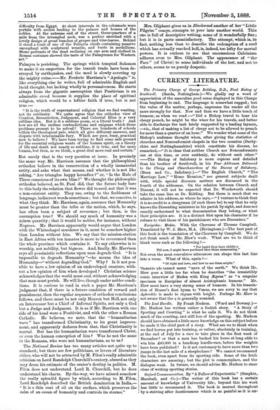CURRENT LITERA_T1JR,E.
The Primary Charge of George Bidding, D.D., First Bishop of Bouthwell. (Sands, Nottingham.)—We gladly say a word of appreciation of the masculine good sense displayed in this Charge from beginning to end. The language is somewhat rugged,; but the value of the matter, perhaps, impresses the reader all the more strongly for that. Now and then we have a little touch of humour, as when we read :—" Did a Bishop travel to hear his clergy preach, he might be the wiser for his travels, and better able to discharge the task lately suggested by a leading layman, —viz„ that of making a list of clergy not to be allowed to preach for more than a quarter of an hour." We wonder what some of the Bishop's audience thought when, after giving the statistics of churches and Nonconformist chapels in the two counties (Derby- shire and Nottinghamshire) which constitute his diocese, he remarked,—"It is clear that neither Church nor Nonconformists can at this time, or ever suddenly, do without each other." —The Bishop of Salisbury is more copious and detailed than his brother of Southwell, in his Four Addresses Delivered to the Clergy and Churchwardens of the Diocese of Salisbury. (Bean and Co., Salisbury.)—" The English Church," "The Marriage Law," "Home Reunion," are general subjects dealt with, while special diocesan matters are discussed in the fourth of the addresses. On the relation between Church and Dissent, it will not be expected that Dr. Wordsworth should take the same line as Dr. Ridding. But there is much that we admire in his address, as where he says,—" I venture to think that it is no credit to a clergyman (if such there be) to say that he only knows the Dissenting ministers in his parish by sight, and does not exactly understand to what denomination they belong, or what their principles are. It is a distinct blot upon his character if he refuses to visit those of his parishioners who are Dissenters."
Euripides : Medea. With the Choruses of Thomas Campbell. Translated by W. J. Blew, M.A. (Rivingtons.)—The best part of this book is the translation of the Choruses by Campbell. We do not think much of Mr. Slew's work. What are we to think of blank verse such as the following?—
For hadst thou been childle's rill now, I might have pardoned thee thine enamouring."
Not even the most convulsive utterances can shape this last line into a verse. What of this, again?— "Of right and laws, and how to use them aright."
'Opelicabv ryis cannot mean "nave of the earth." We think Mr. Blew goes a little too far when he describes "the irresistibly comic interview of Medea with King .lgeus" as "a singular specimen in Euripides of almost Aristophanic humour." Mr. Blew must have a very strong sense of humour. In his transla- tion of Homer's first hymn to Venus, we are sorry to say that Aphrodite is made to rhyme with height. Perhaps Mr. Blew is not aware that the n is generally sounded.


















































 Previous page
Previous page